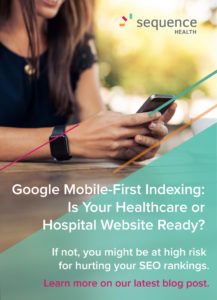Google Mobile-First Indexing: Is Your Healthcare or Hospital Website Ready?

 The Long-Awaited Change in How Google Will Rank Healthcare and Hospital Websites is Just About Here
The Long-Awaited Change in How Google Will Rank Healthcare and Hospital Websites is Just About Here
Since 2016, my colleagues in the SEO blogosphere have been regularly waxing about the importance of being prepared for Google to roll out its “mobile-first indexing.” Although it hasn’t yet to be launched, it is coming—and when it does, it is expected to have significant impacts on how healthcare and hospital Websites are ranked.
In recent months, several of our healthcare SEO and hospital Website design customers have asked us about mobile-first indexing. Here are some of their most frequently asked questions. As you read on, ask yourself: Is your hospital’s Website and SEO ready?
What is Google Mobile-First Indexing?
Google’s mobile-first indexing is the search engine’s conversion to using a mobile Website (rather than its desktop version) for ranking Web pages.
As to why they are doing this, Google offered this explanation on its Official google Webmaster Central Blog:
“Today, most people are searching on Google using a mobile device. However, our ranking systems still typically look at the desktop version of a page’s content to evaluate its relevance to the user. This can cause issues when the mobile page has less content than the desktop page because our algorithms are not evaluating the actual page that is seen by a mobile searcher.”
How Will Mobile-First Indexing Affect My Healthcare SEO?
If your mobile Website provides the same information as your desktop Website, you probably won’t notice any difference in your SEO rankings. Actually, you might even see a boost in your rankings if you are competing against hospitals whose Websites are not ready for mobile-first indexing.
You might now be thinking, “What do you mean by ‘the same information?’” Why would it be different on a desktop or mobile Website?
The short answer is: It mostly depends on how your desktop and mobile Websites were design. This means:
• If you have a newer Website that was built with responsive design — meaning the site automatically adjusts its layout based on whether your visitors are using desktop or mobile browsers — you probably don’t need to worry.
• If your Website isn’t “responsive” but sends the same layout no matter the browser, you also probably don’t need to worry. (Note: Because responsive Websites generally deliver better user experiences, comparable Websites with responsive design will likely have better rankings.)
• If your Website uses different URLs for canonical and mobile browsers, you might not be sending the same information. This could range from minor inconsistencies between what is on the desktop and mobile pages to significantly abridged content on a mobile page.
• If your mobile Website uses AMP (Accelerated Mobile Pages), you might not be sending the same information. A typical example of different information would be when an AMP shows a snippet of a desktop page with a link to read it in its entirety. These types of AMPs will hurt your SEO because it’s not supporting what Google considers to be a positive user experience.
If your Website is not ready for mobile-first indexing, it’s probably best to update or overhaul your Website to a responsive design. But, if budgetary or time constraints prohibit that, your best bet is to prioritize the Web pages that can’t afford to be dinged by mobile-first indexing and start analyzing/updating them.
When Does My Hospital Website Need to be Ready for Mobile-First Indexing?
For all the chatter there’s been the past year about mobile-first indexing and the need to be ready for it, there’s still no set date for when Google will enact it. There is a good possibility that Google has been testing this new indexing strategy over the past year and we won’t see an exact date for its final roll-out. Our recommendation is to be proactive now before you see a drop in visitors to your Website.
As Sequence Health’s Associate Director of Search Engine Marketing, Susan Gullion is one of our most knowledgeable resources for enhancing our healthcare clients’ search engine marketing strategies with SEO, PPC and social media.
Sequence Health is a cloud-based technology and services company that improves profitability and patient outcomes for hospitals and practices through end-to-end patient engagement solutions backed by clinical and non-clinical teams. Its HIPAA-compliant, SaaS platform improves care team workflows, automates patient communication and tracks patient progress to optimize the patient journey. Since 2004, leading healthcare providers have trusted Sequence Health to help acquire, manage and engage patients through complex episodes of care.






